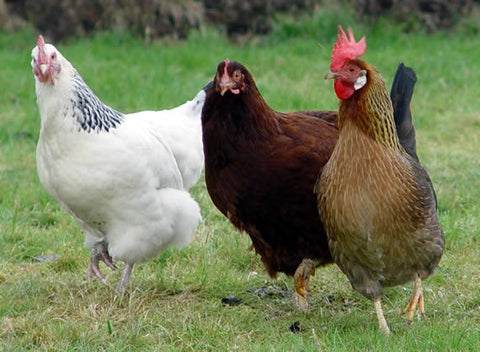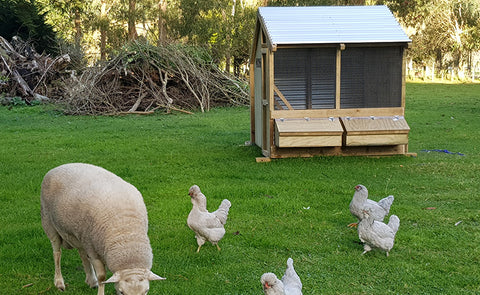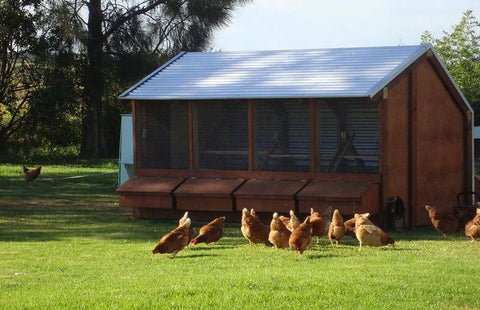Raising chickens in the backyard has become an appealing pastime for many in recent years especially with people spending more time at home and investing in their domestic experience. More and more people are opting for the freshest, healthiest eggs collected daily from their feathery friends.

The best breed of chicken for beginners depends on your climate, your space, the size of your coop, your local ordinance and how many eggs you’ll need a week. Good breeds for beginners include Australorp, Orpingtons, Leghorns, Plymouth Rock, Rhode Island Reds, Wyandottes,Light Sussex and Red or Brown Shavers.
Before you go ahead and contact your local poultry farmer, it’s practical to do a little research on the best chicken breeds for beginners. Although they’ll likely have great advice from lots of experience, every chicken farmer will have their preference on what you should buy. Let’s look a little in depth at the most common chicken breeds for beginners to give you a head start on your search.
How do you start out with chickens?
A flock of feathery friends can teach us more than just where eggs come from. Watching those tiny defenceless chicks grow into endearing egg-laying hens can teach our children about responsibility and relationships with our food. Give your chicks a strong foundation in life by devising a plan to start your egg laying side hustle. Your plan should include:
- Selecting the right breed to suit your needs.
- Determining how many chicks you should raise.
- Exploring reputable chick suppliers.
- Preparing the shelter for your baby chicks.
- Investing in a quality chicken coop and run.
- Considering their feed and nutrition plan.
If you’re seriously considering learning the ropes of poultry husbandry, we created an in depth guide to keeping chickens in NZ to help you along the way.

What to know before buying chickens?
There are a few chicken related factors to consider before you decide on your breed preference. These fundamental points are worth mulling over before you create your ideal flock:
- Climate - What kind of climate do you live in? Do you experience extreme weather? Certain breeds handle the cold or heat differently.
- Egg laying - Are you going to need eggs year round or are they simply to supplement your shop bought selection? Do you prefer big brown eggs or more colourful ones?
- Dual purpose - Are you hoping to fulfil the full sustainable route of providing both eggs and meat? You’ll need breeds that can fulfil this need and a rooster at hand.
- Space - You’ll need to allocate a recommended amount of space per bird, so the size of the breed you decide to raise may depend on the size of your garden.
- Temperament - Some breeds of chickens are naturally more friendly than others.
- Ordinance - check with your local council for any permissions for raising chickens in your area.
What kind of chicken is easiest to take care of?
Do you know how many breeds of chickens there are in the world? The human race has been breeding these birds for millenia so there’s a fair few to choose from. Let alone how many are preferred backyard egg layers. Many first time chicken owners flock to a variety of breeds for their low-maintenance, high production and friendly nature. So we’ve narrowed it down significantly to outline a few of the best breeds with these qualities for family friendly egg production.
Red or brown shavers
Red and brown shavers are a hybrid breed sometimes referred to as Hyline. They are a combination of Rhode Island Red roosters and Rhode Island White hens. They are popular and highly efficient chickens that have been specifically bred to produce large volumes of high quality brown eggs. These tough and resilient birds are low maintenance and are known to be durable in both warm and cool climes.
Plymouth Rock
This common backyard chicken in New Zealand is small enough for your garden coop and requires minimal maintenance. They generally mix well with other breeds as they tend to be docile and calm in nature. They respond well to petting and may even appreciate the occasional cuddle. They make excellent mothers but may go broody in the spring. Other than that they are likely to produce around 4 eggs per week pretty consistently throughout the year.They possess beautiful black and white markings with yellow legs and feet and are very cold hardy.
Rhode Island Red
One of the most common and popular chickens for egg harvesters across the globe, these hardy birds are well adapted for most climates, hot or cold. They have fun personalities with low maintenance needs and will produce many eggs throughout their life cycle; with an average of 4 to 6 eggs per week.The Rhode Island Reds range in colour from a deep pink to almost black. They don’t do so well in warmer climates but are more hardy in the cold.
Light Sussex
Light Sussex chooks are a versatile breed with their charming and bubbly personality and regular egg laying of around 4 eggs per week. Their broiler lineage means that they’ll also make great meat when the time comes, if that’s what you’re looking for. They are relatively low maintenance and tend to enjoy a cuddle with their owners. They are white birds with striking black tails and collars and are very cold hardy.
Wyandotte
The big and beautiful Wyandotte are not overly affectionate but are calm and docile chickens. They will produce you many eggs over the years, around 4 per week. They are good at foraging for their own food, are extremely low maintenance chickens and make for excellent dual purpose chicken dinners once the time comes.They come in a variety of colours and are extremely winter hardy.
Orpington
The calm and cuddly orpingtons are cute and fluffy small birds that make excellent additions to the family. They can lay 4 or 5 eggs every week for a good portion of the year. They look great, fit well in the coop and have a lovely temperament. They come in a variety of colours and are cold hardy due to their fluffy plumage.
Leghorn
Leghorns were previously widely used for commercial egg laying. They are typically brown or white in colour and produce large white eggs. They tend to be laid back and friendly chickens that lay up to 250 eggs per year for many years. They’re great foragers for their own food which may save you in food costs.They come in a variety of colours including white, brown, black and buff and are very cold hardy.
Australorp
The Australorp has a reputation for being great for beginner egg farmers. These chickens are of Australian origin and are famous for laying more than 300 eggs yearly quite consistently. This breed is friendly, affectionate, great foragers and will lay for many years. They are generally low maintenance and thrive in a minimal food and water coop. They can handle high temperatures with ease yet are not cold hardy. They come in black, white or blue.

How many chickens should a beginner start with?
When you’re just starting out with your chicken husbandry, we don’t want to overwhelm you. We especially don’t want to instigate regrets as to your decision to take on this extra responsibility. As with most things in life, if you start with caution you can always grow your flock at a later date once you’ve got the hang of it.
Saying that, you’ll likely see strong evidence to suggest that chickens are fairly social feathered fellows and genuinely prefer to flock together. Your chickens are more than capable of forming connections not only with each other but with their human companions too. Especially if you raise them from tiny chicks.
On another note, if you truly want to sustain a healthy egg producing flow for all your family’s egg consuming needs, you might find that two chickens is not enough. With these three reasons combined, many chicken raising experts would suggest that you start off with at least three to five chickens in your initial flock.
Can you mix different breeds of chickens together?
An array of multicoloured chickens clucking around your lawn can be as cute as pie and pleasing on the eye but before you give in to your indecisiveness about which breed to commit to, we have to consider their temperament and their ability to regulate their temperature in colder or warmer climates.
Some breeds can be calm and docile such as the Austraporps and Wyandotte, while others tend to be dominant and rather noisy such as the Leghorn or the Rhode Island. These two types of breeds may not mix well and could cause tension in the coop. Additionally, some birds are hardier in warmer weather such as Orpingtons while others are more accustomed to the cooler climes such as the Wyandotte. You may struggle to please both breeds in one coop.
While it’s certainly possible to mix breeds and create a diverse congregation of clucking folk, it’s best to research the breeds thoroughly before you confine them to close quarters.
Is it cost effective to own chickens?
While the initial costs of setting up your backyard chicken farm might seem astronomical if accomplished correctly it can balance out to be pretty economical in the long run. Once your hen house, chicken run, feed and bedding supply is in place and doing their job, you’ll likely not have too many expenses to worry about as long as your chickens are healthy and happy. Check out our blog on how to raise healthy chickens.
If, before you decided to raise your own flock, you were popping down the farmers market for your premium quality eggs every week then owning your own egg producing coop will likely save you money going forward. However, it’s hard to compete with cheap factory-farmed eggs, so unless you care deeply about your food source and the enjoyment of collecting your breakfast every morning then raising chickens may not be for you.
We all know that money makes the world go round but it’s important to think long and hard about whether the advantages outweigh the disadvantages for you when it comes to taking up chicken husbandry.
Do chickens recognize their owners?
Chickens do in fact recognise their owner, research suggests that chickens can remember many human faces. One way you can encourage your chicks to recognise you sooner is to spend time with them. If you encourage them to see you when you put their food out every morning this will help them to connect the link between you and their food source. As with most animals this will quickly encourage them to like you.
Saying that, most people don’t own chickens for the affection they’ll receive. If you’re looking for a loving relationship with a pet, then a dog might suit you better. That doesn’t mean that chickens don’t bond with their owners, but each animal will have different characteristics to show this.
Chickens will often show affection to their owners. This can come in the form of rubbing their beak on your neck, watching you as you move around, clucking at you endearingly, tilting their head as you talk or even squatting to be petted. Pay attention to your hens body language and you may see the affection they have to offer.
For more information about our built strong chicken coop kitsets reach out to us today.




